 MyCatBreeds
MyCatBreeds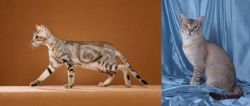 Sokoke is originated from Kenya but American Keuda is originated from United States. Both Sokoke and American Keuda are having almost same weight. Both Sokoke and American Keuda has almost same life span. Both Sokoke and American Keuda has same litter size. Both Sokoke and American Keuda requires Low maintenance.
Sokoke is originated from Kenya but American Keuda is originated from United States. Both Sokoke and American Keuda are having almost same weight. Both Sokoke and American Keuda has almost same life span. Both Sokoke and American Keuda has same litter size. Both Sokoke and American Keuda requires Low maintenance.
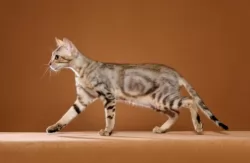 Compared to other breeds of cat, the rare Sokoke Forest Cat is a fairly new natural breed. It comes from the Sokoke district of eastern Kenya but was developed in the USA.
Compared to other breeds of cat, the rare Sokoke Forest Cat is a fairly new natural breed. It comes from the Sokoke district of eastern Kenya but was developed in the USA.
It is in fact, named after the Arabuko Sokoke National Forest, from where the wild foundation stock came from. Wildlife artist Jeni Slater started breeding these cats in the 1970s. They eventually reached Denmark, where further breeding continued, with the cat becoming popular with local cat fanciers, and laid the foundation of the breed in Europe.
Today, there are just a few breeders registered in the UK and TICA, The International Cat Association lists the Sokoke cat as a New Preliminary Race and it was recognized by FIFe in 1993.
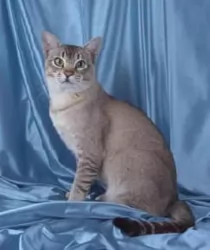 It is thought that the cat was brought to America by the Spanish to keep the rat population down.
It is thought that the cat was brought to America by the Spanish to keep the rat population down.
The name KEUDA stands for Kitten Evaluation Under Direct Assessment which is actually the name of a program that was running in Texas, Oklahoma and New Mexico and was for investigating the kinds of cats that survived as barn cats.
Today the Keuda isn’t registered and it’s not a well-known cat either, being looked upon as being similar to the Egyptian Mau breed as it shares some physical similarities with the Mau.
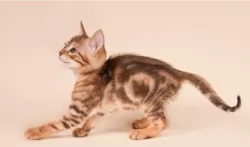 The Sokoke is a medium-sized cat with a long, lean body and slender legs. The hind legs are somewhat longer than the front legs. The head is smallish and round and he has a constantly alert look to him.
The Sokoke is a medium-sized cat with a long, lean body and slender legs. The hind legs are somewhat longer than the front legs. The head is smallish and round and he has a constantly alert look to him.
A striking characteristic of the Sokoke cat is its tabby fur, which people say looks like the bark of a tree and it is brindle in coloring.
The tail is medium to long and the ears are also fairly large, The eyes are large and almond-shaped and can be greenish to brown. The coat is short and coarse.
Cat lovers enjoy these playful, curious, intelligent, and family-orientated cats. In spite of their wild side, they adapt easily into different homes.
They’re inquisitive and will follow you, much like a dog. They will even enjoy a leash being put on them and being taken for a walk. They’re very sociable and vocal too and get on with everyone, children and other pets included.
They’re playful cats, loving to jump and climb and then look down at you from their high perches. Easily bored, you will need to provide fun and games continuously.
They enjoy being involved with everything you’re doing and form a strong bond with their owners. Because the Sokoke is social and affectionate, they require quite a lot of attention, and if they don’t get the attention they crave, they meow in anxiety.
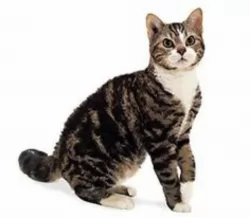 You can’t really pin-point what the American Keuda looks like as it looks a lot like the Maus but it can also look like a Siamese cat or even others.
You can’t really pin-point what the American Keuda looks like as it looks a lot like the Maus but it can also look like a Siamese cat or even others.
It is a medium-sized cat and can weigh up to 5 or 6kg while being very lithe and athletic. The head of the cat is medium-sized, the ears medium-large, the eyes almond-shaped, and the tail is slightly tapered.
An unusual aspect with this cat is its belly flap – loose skin that flaps at each elbow. The head is wedge-shaped, it has almond-shaped eyes, large ears and the fur is soft and silky and in a variety of patterns as well as solid colors. The coat is short to medium in length and there is no undercoat.
American Keudas are just your regular cat in personality - active, adaptable, inquisitive, and intelligent while being strong and agile.
They are also adaptable and social, getting along well with children as well as other pets in the home. It is also quite unusual in that it likes playing with water. They are also playful and love running, jumping and climbing and indoors it will want a climbing cat tree.
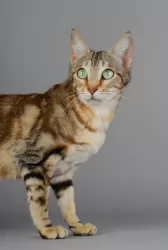 Your Sokoke is a very social cat and he will get on particularly well in a home with children who have been taught to be kind and gentle with animals.
Your Sokoke is a very social cat and he will get on particularly well in a home with children who have been taught to be kind and gentle with animals.
They are able to adapt well to homes where there are other pets too. They just love exercise and lots of fun. They don’t like being in a home where the owner is out at work all day. The solution to this is to provide him with another cat as a companion.
Sokoke cats are great with people of all ages, and when you bring one of these lively cats into your home, make sure he also receives his share of love and companionship.
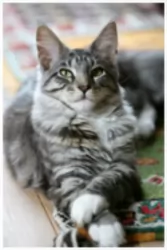 The beauty of American Keuda cats is that they are no-fuss cats and they are energetic, amicable, social, and playful and they make wonderful companions.
The beauty of American Keuda cats is that they are no-fuss cats and they are energetic, amicable, social, and playful and they make wonderful companions.
They are also fond of water and can even strike up a friendship with your dog. By bringing a Keuda into your home you can rely on a steady, loving friendship with your feline friend.
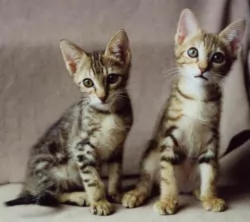 Sokoke cats are generally healthy and have no inherited diseases. To ensure that your Sokoke stands a chance of having a healthy life, you need to have him vaccinated against the life-threatening cat diseases there are.
Sokoke cats are generally healthy and have no inherited diseases. To ensure that your Sokoke stands a chance of having a healthy life, you need to have him vaccinated against the life-threatening cat diseases there are.
If your Sokoe cat isn’t his usual self day after day, make a point of getting him to the vet just as soon as possible.
Parasites are a terrible scourge with cats, and in fact, the number one cause of hair loss in cats is fleas. The bite of a flea can cause an allergic reaction. Your cat can become miserable with continuous biting, itching, and scratching and this can all lead to hair loss.
It is a wise move to speak to your vet about a good product to treat your furry friend with.
There can actually be many causes of diarrhea in cats and one of them is parasites, but it can also be caused by a viral infection or food allergy or something else.
You want to get your cat to the vet who can help you bring it under control. You may also have to feed your cat a bland kind of diet to help the cat’s digestive tract recover from the diarrhea.
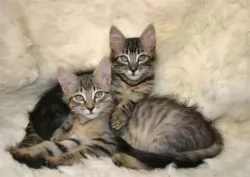 Thes cats enjoy good health and live to be 15 years of age or older even. You just have to watch out for him as they have no undercoats and it’s not a cat to do well in the cold.
Thes cats enjoy good health and live to be 15 years of age or older even. You just have to watch out for him as they have no undercoats and it’s not a cat to do well in the cold.
Whenever you buy a cat for the first time, try and find out about vaccines and previous conditions that might require special treatment.
Healthy kittens and cats are always alert and energetic with shiny coats and clear eyes.
Dental disease is quite common in cats, and it is always a good idea to have your pet’s teeth checked by your vet. Signs of pain with dental problems can include lethargy, pawing at the mouth, facial swelling, and reduced appetite. Get your cat immediately to the vet if you suspect problems with his teeth.
Neutering and spaying are imperative if you don’t want your pet to have kittens. It’s a simple operation for your pet and it comes with many health benefits for your cat. You don’t want your female cat having kittens as there are just already so many stray cats in shelters. Spaying and neutering mellows a cat too, makes them less prone to wandering, spraying, and fighting.
Make sure you have your American Keuda vaccinated against the many cat diseases that there are. Vaccinations are available against feline infectious enteritis or feline parvovirus, cat flu and feline leukemia virus, a disease that damages the cat’s immune system. Kittens require their first vaccine at around 8 weeks of age.
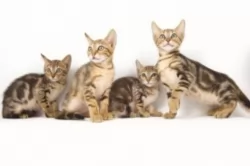 Because the Sokoke’s coat is short and close-lying, with little or no undercoat, brushing once a week will be sufficient.
Because the Sokoke’s coat is short and close-lying, with little or no undercoat, brushing once a week will be sufficient.
The Sokoke cat is very energetic, and he will need games, toys, and attention to keep him physically and mentally stimulated. They love climbing so a climbing tree and other kind of equipment will be a good idea.
Provide your cat with a litter box and ensure it is kept scrupulously clean by removing the cat’s feces every single day.
Diet is of critical importance to the health and happiness of a cat. Some people try to feed their cats human foods and wonder why their cat is continuously sick. A cat is a carnivore and he requires meat.
You can speak to your vet about the best kind of commercial cat food there is for your cat. Read the label and feed him portion-sizes as directed.
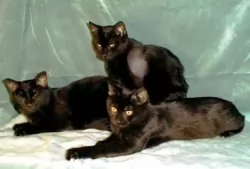 Every cat needs to be fed a complete, balanced high-in-protein food. There are heaps of different brands of cat food on the market - wet and dry. Always follow the manufacturer’s instructions and recommended amounts. If in any doubt about what to feed your cat, speak to your vet. Every cat needs a constant supply of fresh, cool water.
Every cat needs to be fed a complete, balanced high-in-protein food. There are heaps of different brands of cat food on the market - wet and dry. Always follow the manufacturer’s instructions and recommended amounts. If in any doubt about what to feed your cat, speak to your vet. Every cat needs a constant supply of fresh, cool water.
Both young and older cats love to play so ensure you provide your cat with stimulating toys as well as things such as climbing trees and a scratching post. Cats enjoy a high-up place where they can feel safe and view their surroundings from a height.
Cats spend many hours a day sleeping and you need to provide your cat with a warm, dry, comfortable, quiet place to rest. There are many cat beds available, but if you don’t have one, a cardboard box with one side removed and a soft cushion or blanket will do.
Invest in a litter box for your cat to do his business in and keep it in a safe, quiet place where your cat can ‘toilet’ in peace and quiet. These should be placed away from the food and water bowls. Make sure to keep a small plastic rake close by and rake up the cat droppings regularly to ensure the litter tray is nice and clean.
Your American Keuda is a short-haired cat but you want to brush the fur gently at least once a week. Grooming also provides you and your cat with some valuable bonding time.
Provide your cat with a collar to show everyone that he is yours. Also, have your cat microchipped – a tiny chip that carries your pet’s unique ID number and which is inserted safely and gently under the cat's skin.
Have your cat treated and free from parasites such as ticks, fleas, and worms. Speak to your vet about this.